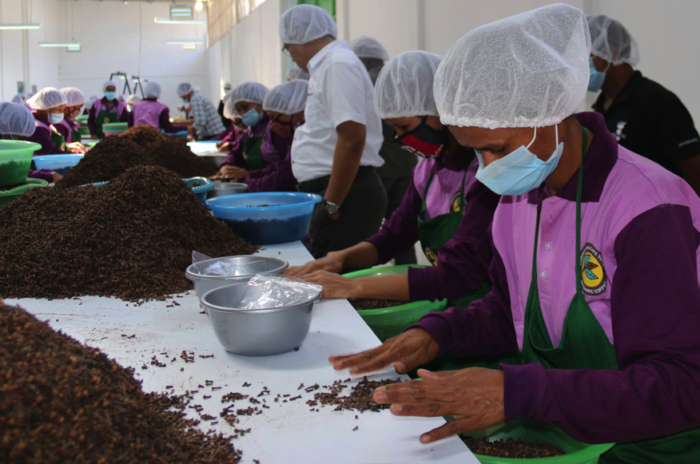
A new project funded by the Government of New Zealand to sustainably improve farmer household incomes and health outcomes in Timor Leste will leverage NCBA CLUSA’s legacy in the country, building on already substantial achievements.
The five-year, USD $9.5 million activity, “Raising Incomes through Sustainable Export-Agriculture (RISE)” is part of New Zealand’s work in Timor Leste to develop a sustainable economy. The project also aligns with priorities outlined by the Government of Timor Leste, which include diversifying the country’s export revenue away from oil and gas toward high-value export crops such as coffee, cocoa and spices.
The RISE project will build on the success of the Coffee and Cocoa Agribusiness Opportunities (CACAO) project, which closed in 2020. Also funded by the Government of New Zealand, CACAO worked with 15,300 coffee farmer households to rehabilitate the equivalent of 5,375 contiguous acres (2,177 hectares) of coffee trees and establish 6,200 new cocoa farms. CACAO also strengthened farmer capacity and established critical infrastructure including seedling nurseries; demonstration plots; large capacity compost fertilizer production operations; processing, storage, transport and marketing facilities; and farmer training programs.
Despite these significant improvements as project beneficiaries increased production threefold, Timor Leste’s overall economy continues to face low farmer incomes and poor farmer household health outcomes. Eighty percent of the country’s close to 1.3 million people depend on agriculture for their livelihoods, with the majority living off subsistence agriculture. Even in the coffee sector—Timor Leste’s principal cash crop—productivity is less than 20 percent of the global average, according to the UN’s Food and Agriculture Organization. Other high-value cash crops, such as cacao and spices, are not yet widely grown. The country’s lowland areas where Arabica coffee cannot be grown are particularly disadvantaged.
In partnership with Cooperativa Café Timor (CCT), NCBA CLUSA will recruit and provide services to 16,250 farmer households to participate in RISE. The project will invest in improving the knowledge and skills of farming families in health and agriculture; the long-term production of expanded cocoa and spice crops; and ongoing increases in productivity from rehabilitated coffee trees.
As Timor Leste’s leading private-sector employer and the country’s largest purchaser, processor and exporter of coffee, cocoa, vanilla and cloves,, Cooperativa Café Timor (CCT) is an ideal implementing partner. Established with support form NCBA CLUSA in 1994, CCT offers its 27,000 farming families access to international specialty markets, better prices and healthcare through its network of health clinics serving remote mountain coffee-growing communities. Over five years, RISE will:
- Rehabilitate 10,000 coffee farms across five municipalities
- Provide farm extension support and inputs to 5,500 farm households to establish new or expand existing cocoa production
- Provide farm extension support and inputs to 1,100 farm households to establish new spice (vanilla, pepper and cloves) production
NCBA CLUSA and CCT will achieve these goals within a context that is sensitive to the impacts of climate change. Timor Leste faces increasingly severe and frequent natural disasters as a result of climate change. Farmers in the country urgently need knowledge, skills and inputs to improve climate resilience on their farms. RISE will provide shade trees, organic fertilizer and training to improve soil health, reducing the impacts of climate change and environmental degradation.
Finally, RISE will continue to provide support to mitigate the impacts of COVID19 by creating a safe environment for both beneficiaries and staff. The project will also increase farmer household knowledge of health, housing, water and sanitation issues so that they can make informed choices for their families, ultimately improving Timorese farmer family well-being.
For more than 65 years, NCBA CLUSA has worked in 100+ countries in Africa, Latin America and Southeast Asia, building resilient communities, creating economic opportunities and strengthening cooperatives and producer organizations. Our work empowers smallholder farmers, women and youth in the areas of food security and nutrition-led agriculture, climate-smart agriculture, market development, natural resources management, positive youth development, gender equality and enabling regulatory environments.


